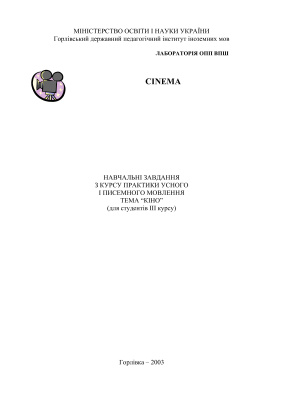Г.: Вид. Центр ГДПIIМ, 2003. – 80 с.
This book is another course for the third year students of English
as a foreign language. The prime need of the third year student is
to be able to understand and use the language simply and
effectively. Students need to know that the English language will
enable them to communicate their needs, ideas and opinions.
To be able to operate effectively in the real world, students need plenty of opportunity to practise language in life-like situations. Motivation comes from knowing that language activities in the classroom are at all times meaningful, and aimed at real-life communication.
The book includes extensive material on the history of world cinematography, different genres of film, television and its effect on people, cult fiction, famous film directors and actors.
The structure of units is traditional: the unit includes listening and speaking, reading, vocabulary and grammar and writing sections. Each unit is provided with the list of words of essential vocabulary (Vocabulary Area) and a functional exponent (Functions Practised). The novelty introduced is a chapter devoted to autonomous work of students in General English.
For many students, understanding spoken language is a major source of difficulty. Listening practice, which provides exposure to the native speaker language, is an important component in any language course. Students need to be given the competence to cope with the material which is a little beyond their productive level and not be discouraged if they do not understand the meaning of every word.
Leaing to speak a language is the most important aim of the language leaers. As student-talking time in class can be short, every opportunity should be taken to provide speaking practice. Initially the students follow models in pair work exercises, short group-work tasks and role-plays. ‘About you’ questions play an important part. These questions give students an opportunity to relate the content of the lesson to their own lives and experience, to the features of life in their own country by inviting them to make comparisons.
Reading texts are an invaluable source of language input and are an essential ingredient of language course. The reading texts serve a number of purposes: they present new language, they consolidate language already leat, and they inform and discover how much of a challenging text they can understand.
Writing is not only an aid to consolidating new language but is a meaningful activity in itself. The process of writing and of organizing one’s thoughts coherently is an important and valuable as the final piece of writing. Writing tasks should first be prepared orally to help students with the organization of their writing.
The Student’s Book contains 11 Units and a guide to autonomous work on movie watching. The book is supplied with answer keys and the tapescripts of the recorded material.
All teaching material is organized according to the official academic syllabus for the third year students. This book is recommended for work in the TELECOM class, so that each student has an opportunity to practise the language effectively and develop their individual language skills.
To be able to operate effectively in the real world, students need plenty of opportunity to practise language in life-like situations. Motivation comes from knowing that language activities in the classroom are at all times meaningful, and aimed at real-life communication.
The book includes extensive material on the history of world cinematography, different genres of film, television and its effect on people, cult fiction, famous film directors and actors.
The structure of units is traditional: the unit includes listening and speaking, reading, vocabulary and grammar and writing sections. Each unit is provided with the list of words of essential vocabulary (Vocabulary Area) and a functional exponent (Functions Practised). The novelty introduced is a chapter devoted to autonomous work of students in General English.
For many students, understanding spoken language is a major source of difficulty. Listening practice, which provides exposure to the native speaker language, is an important component in any language course. Students need to be given the competence to cope with the material which is a little beyond their productive level and not be discouraged if they do not understand the meaning of every word.
Leaing to speak a language is the most important aim of the language leaers. As student-talking time in class can be short, every opportunity should be taken to provide speaking practice. Initially the students follow models in pair work exercises, short group-work tasks and role-plays. ‘About you’ questions play an important part. These questions give students an opportunity to relate the content of the lesson to their own lives and experience, to the features of life in their own country by inviting them to make comparisons.
Reading texts are an invaluable source of language input and are an essential ingredient of language course. The reading texts serve a number of purposes: they present new language, they consolidate language already leat, and they inform and discover how much of a challenging text they can understand.
Writing is not only an aid to consolidating new language but is a meaningful activity in itself. The process of writing and of organizing one’s thoughts coherently is an important and valuable as the final piece of writing. Writing tasks should first be prepared orally to help students with the organization of their writing.
The Student’s Book contains 11 Units and a guide to autonomous work on movie watching. The book is supplied with answer keys and the tapescripts of the recorded material.
All teaching material is organized according to the official academic syllabus for the third year students. This book is recommended for work in the TELECOM class, so that each student has an opportunity to practise the language effectively and develop their individual language skills.

